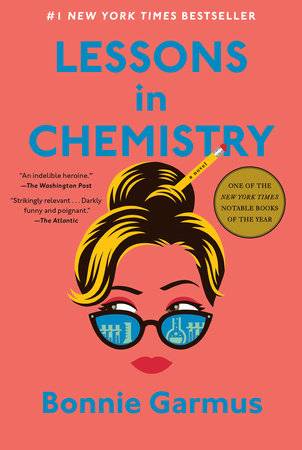
This quintessential page turner is quite a straightforward book, both linguistically and thematically, which is not to suggest it is not well written- or a good book in general- its just that there is lack of nuance and complexity, making it fall short of being a great one.
It does, however, have a gripping plot, an inspiring protagonist and a host of endearing and quirky characters- including humans and canines.
Written by first time author Bonnie Garmus and set in the United States of the 1950s and 60s, ‘Lessons in Chemistry’ tells the story of Elizabeth Zott- unwitting celebrity chef, single mom, and frustrated scientist, whose aspirations and potential for making it big in a regressive workplace, and indeed society, are thwarted time and time again.
These include, being subjected to casual everyday chauvinism, sexism, and prejudice, theft of her work, attacks on her reputation and at its absolute worst a most disturbing instance of rape and another of attempted sexual assault.
The silver lining on the grim proceedings is Elizabeth’s love story with Calvin Evans, a renowned chemist and a ‘notorious grudge holder’. Things look up for a while as the couple build a life, become rowing partners and adopt a dog, who they name Six-Thirty. However, tragedy strikes, completely derailing Elizabeth’s personal life and single-minded pursuit of her ideals.
Opportunity arrives in the form of a television cooking show, where in front of a live audience, Elizabeth uses the platform to not only teach women about the chemistry of cooking, but also a thing or two on how to live life on their own terms and never to give up on their dreams and ideals.
The book is highly recommended to young readers- albeit with a trigger warning for graphic sexual assault. Elizabeth is exactly the kind of role model young girls need- gifted scientist, loving mother to prodigious daughter Mad, inspiringly self-assured, admirably immune to societal norms and a great believer in science and logic. There’s many aphorisms and life messages written in a free-flowing, approachable manner that are bound to resonate, for example:
“Some things needed to stay in the past because the past was the only place they made sense.”
“Your days are numbered. Use them to throw open the windows of your soul to the sun,”
“Sometimes I think," she said slowly, "that if a man were to spend a day being a woman in America, he wouldn't make it past noon.”
Through the character of the dog Six-Thirty, there can be an introduction to magical realism, that may have some readers divided but personally I found it adding a quirky charm to the story.
To the more seasoned reader, however, despite the theme and the page turning readability, the treatment can be a tad lacking. For one, there is not much subtlety and nuance, with characters clearly demarcated between the good and the bad, the noble and the evil, reducing some of them to mere caricatures.
Also, while there’s no disputing the book’s message of women empowerment and gender equality, the way it is delivered leaves one underwhelmed. There are no quiet scenes that give the reader an idea of Elizabeth Zott’s inner world, private battles or emotional conflicts. Some of us like to connect with our protagonists and inhabit their world with them but Zott’s often times one dimensional character makes it challenging- her actions serving little purpose other than furthering the plot.
Neither are Elizabeth’s views and actions consistent with the era. No matter how progressive, humans are very much a product of their times, and this makes it is difficult to look past the anachronisms. It is as if the 1950s setting of the story is being viewed through a very 2023 lense, replete with lengthy monologues and lectures aplenty on current feminist concerns including gender pay gaps, stay-at-home mothers not being appreciated, mansplaining, being equals in romantic partnership etc. There's even a part where Elizabeth criticizes a can of soup for having 'chemicals' in it. Imagine this from a time period when a can of Campbell epitomised wholesome goodness!
The climax relies heavily on coincidence and a series of unexpected revelations reminiscent of typical Bollywood revenge flicks from the 80s and 90s so much so that one half expects Calvin Evans to make a return from the dead in the same grand tradition. On a more serious note, the ending makes the eventual take away seem rather confusing. So structural sexism and misogyny will magically fall away for those blessed with sheer luck and conveniently serendipitous plot development? One could argue it’s all part of the larger-than-life world created by Garmus, raising important issues along the way but for all its revolutionary fervour, ultimately geared towards giving its readers an old fashioned, satisfying resolution.
Moreover, the setting of the novel in the dark days of the 1950s and 60s implies that sexism or patriarchy are a thing of the past. The overturning of Roe vs Wade by the Supreme Court of the United States only last year and continued questions on how the ‘Me too movement’ may actually be hindering opportunities for women in the workplace, indicates how deeply sexist the American society continues to be.
Understandably, most reviews put the book as satisfying, moving and thought provoking but inexplicably also as funny, hilarious or comic, which, in light of the disturbing rape scene and the whole sequence that follows- that too within the first few chapters, it is not.
So yes, with parental guidance, “Lessons in Chemistry” is a thoroughly engaging book with a worthy heroine for young women everywhere. Mature readers, too, will enjoy the well-crafted story, especially if they can exercise enough suspension of disbelief or/and are fans of happy endings a la mainstream Bollywood.

